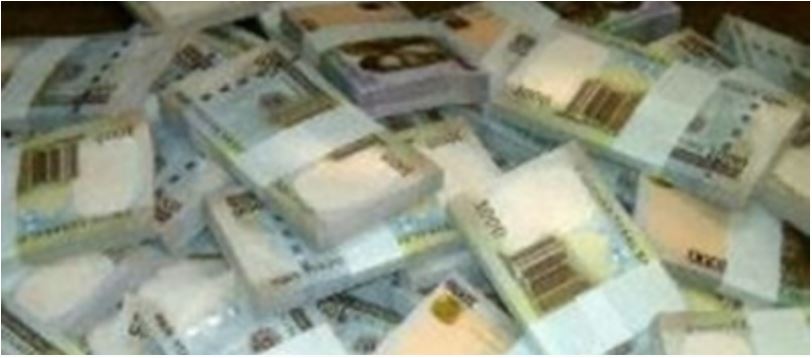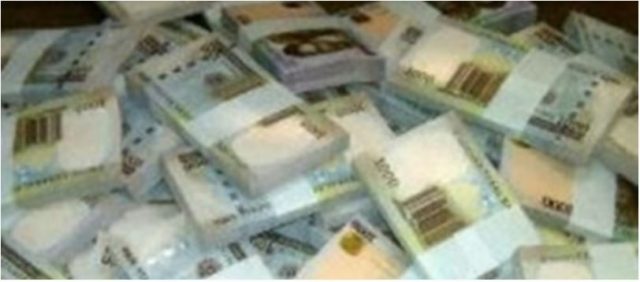 From all indications, it appears that Nigeria, the largest economy in sub-Saharan Africa, is broke and desperately needs to balance its books or else it will go burst. Glean from the recent presentation by the finance and budget minister, Zainab Ahmed, the country has been unable to meet its revenue targets for upward of three years now and there is no indication that it will do so very soon in spite of its attempt to raise the Value Added Tax.
From all indications, it appears that Nigeria, the largest economy in sub-Saharan Africa, is broke and desperately needs to balance its books or else it will go burst. Glean from the recent presentation by the finance and budget minister, Zainab Ahmed, the country has been unable to meet its revenue targets for upward of three years now and there is no indication that it will do so very soon in spite of its attempt to raise the Value Added Tax.
Last year, the government projected a total retained income of about N6.99tn from both oil and non-oil sources, hardly did the government realise 55% of the projections. This was due to its inability to meet its production target for crude oil, which was estimated at 2.3 million barrels per day, as the average production stood around 1.8 million barrels per day during the period.
Also, income from the non-oil dipped by 24% from the approved N1.47tn projected by the government for the entire year while VAT was short by 28% from the approved estimates for the year.
However, amount spent on debt service in 2018 was put around N2.15tn against N1.74tn disbursed for capital projects in the course of the year.
In the 2019 budget, the government had projected to produce 2.3 million barrel of oil per day but so far production level hardly surpassed last year’s figure. Besides, its non-oil revenue has not performed fairly well too. Income from the oil sector for the first half of the year remains abysmally low, short of the projection by 41 per cent, VAT income short of 15 per cent while government was able to make up with about five per cent more than projection from the non-oil sector as at the first half of the year.
Again, debt service already gulped N1.19tn as of the first half of the year, 18 per cent more than projection while no capital vote had been disbursed up till the end of June. What this means is that the government has been paying salaries and servicing debt without adding to the growth and development of basic infrastructure in first six months of the year.
The signals are ominous and this is evident from the economic performance in the first two quarters of the year. The country’s Gross Domestic Product grew by 1.94 per cent in the second quarter of the year, lower than the 2.01 per cent in the first three months of the year. Compare this with the rate of population growth, then you will understand that Nigeria is on the negative trajectory.
The gloomy part was the fact that as it is, Nigeria is spending about 54 per cent of its revenue collections to service debt, leaving around 46 per cent to pay salaries and overhead cost, with little or nothing left for capital projects.
To correct this anomaly, the government is proposing a number of revenue drives to boost its income from the non-oil sector to enable it to finance its budget proposals.
One of the moves to boost revenue was the recent hike in VAT rate from five per cent to 7.5 per cent in the 2020 budget by the government. Other steps include the review in payment for National Identity Management Commission card, planned excise duty on carbonated drinks and other reforms being carried out by government agency to boost income and cut back on cost of governance.
There are other areas the government is not looking into due to the political backlash it would generate against it from the public.
At the just concluded meeting of the International Monetary Fund and the World Bank in Washington DC, the Bretton Wood institutions had called on the government to slash back on subsidy on petroleum products and unify its exchange rates to save some funds to finance developmental projects.
Nigeria currently subsidises the pump price of fuel because though the country is a leading oil producer in the world, it has to import the refined products as a result of little attention to domestic refining of crude oil in the country.
A cut or outright removal of subsidy on fuel consumption could save Nigeria in excess of N1tn annually, while merging the exchange rates could boost the government revenue from the exchange rate differentials.
However, the two options are tough for the government to take due to the possible backlash that may follow as a result of public discontent and resistance to the move.
For instance, Nigeria could attract additional income from the unification of its exchange rates by allowing the market to determine the rate of exchange.
The naira currently exchanges at the Central Bank of Nigeria window at N305-306 to the dollar, while the local currency exchanges at N360 to the dollar on the parallel market, N161.5 to the dollar on the investor’s and exporter’s window. A merger of the rates could see the local currency trading around N360-363 to the dollar, according to some analysts; N60 from each dollar sold could accrue to the coffer of the government and help it to balance its books.
Equally, a removal of the fuel subsidy could help secure around N1.14tn estimated spent on subsidising fuel consumption this year alone.
More importantly, in spite of paying lip service to cutting the cost of governance, the government has done little to slash emoluments for political office holders, which run to several billions of naira yearly.
Why it will be a tough task for the government to balance its books and be able to fulfil its electoral promises to the populace is because most politicians are not willing to make the needed sacrifice on their part.
In most developed economies, the governments of such countries like the United Kingdom, the United States, Germany, etc are not running on resources generated from natural resources. Rather, government is funded by taxes paid by the people and corporates. In a place like the US, taxes on income are as high as 40 per cent on certain categories of individuals and businesses.
However, such taxes are judiciously deployed to create an enviable environment for the people and businesses, which in turn helps them to generate more income and serve as incentive for them to continue to pay their tax obligations.
In a developing country like ours, governments are not accountable to the people, whom they expect to pay tax and support the running of the government, aside from the fact that political office holders are living larger than the entire society they are supposed to protect.
News from Brazil a few weeks ago indicated that the country’s parliament decided to reduce the number of people in the legislative arms of the government as part of measures to reduce cost of governance.
In Nigeria, the government a few months ago increased the size of the bureaucracy by appointing more ministers to run the government from 37 previously to 42, simply for political reasons without consideration for the consequential cost on the finance of the government. Equally, the cost of sustaining the National Assembly remains a huge burden on the economy and yet the government is not willing to do what it will take to cut down the burden.
Today, the country’s total debt has ballooned to around N26tn as of June this year. While the country spent around 58 per cent of its income to service debt, it will take enormous task for the country to enjoy any meaningful development under such a financial condition.
Nigerians are reasonable people and would be willing to make some concessions in the interest of economic growth and development of the country if only they could see the government demonstrate good intentions.
The government must be willing to cut down on the huge wastage in government expenditures, block all leakages and be ready to engage the populace in a transparent manner, otherwise any reform to restructure the finance of the government will continue to meet with resistance from the populace.
The unification of the multiple exchange rates is an imperative to further save the Central Bank of Nigeria from further eroding its shareholders’ fund and keep the regulatory bank in a stable position to continue to dictate the monetary policy direction for the country.
The situation where government revenue is calculated at N305 to the dollar while the real exchange rate is between N360 and N362 to the dollar on the main segments of the forex market is untenable. The cost of sustaining naira stability at the present level has been huge on the CBN, which has invested a huge portion of its shareholders’ funds to fund the Open Market Operations to defend the naira.
The removal of the subsidy on fuel consumption is another measure to boost government finance. As tough as such a decision would be, it is inevitable if the country is willing to overcome its debt burden and free some funds to finance developmental projects.
The choices before the government to improve its finance and balance its books are limited, but would the leadership be willing to take such a tough decision to reposition the economy and end years of misery in the country? Time will tell and of course time is running out on this government to live up to expectations of those who voted for change and stop the business as usual as it is currently going on in the country.
Source: PunchNG







